Do you have a degree in finance or serious accounting skills? If so, now is a great time to start your own financial business and stop drivingsomebo ...
You might consider targeting a niche, such as personal loans.
We earn commissions if you shop through the links below. Read more
Written by: Carolyn Young
Carolyn Young is a business writer who focuses on entrepreneurial concepts and the business formation. She has over 25 years of experience in business roles, and has authored several entrepreneurship textbooks.
Edited by: Mark Stewart
Mark Stewart is the in-house Certified Public Accountant, an accomplished author and financial media specialist.
Published on May 15, 2023

Investment range
$39,900 - $68,200
Revenue potential
$120,000 - $360,000 p.a.
Time to build
3-6 months
Profit potential
$72,000 - $108,000 p.a.
Industry trend
Growing
Commitment
Full-time
Important elements to think about when starting your finance company:
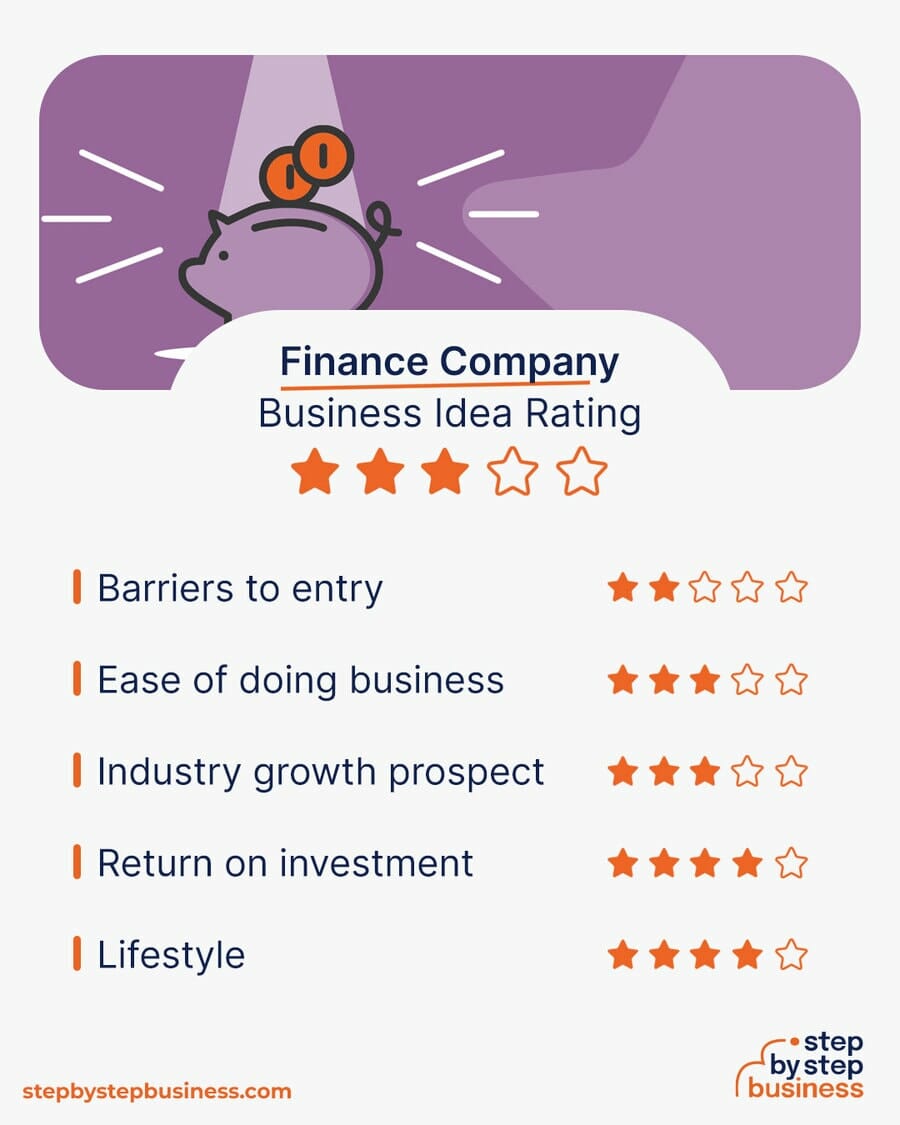
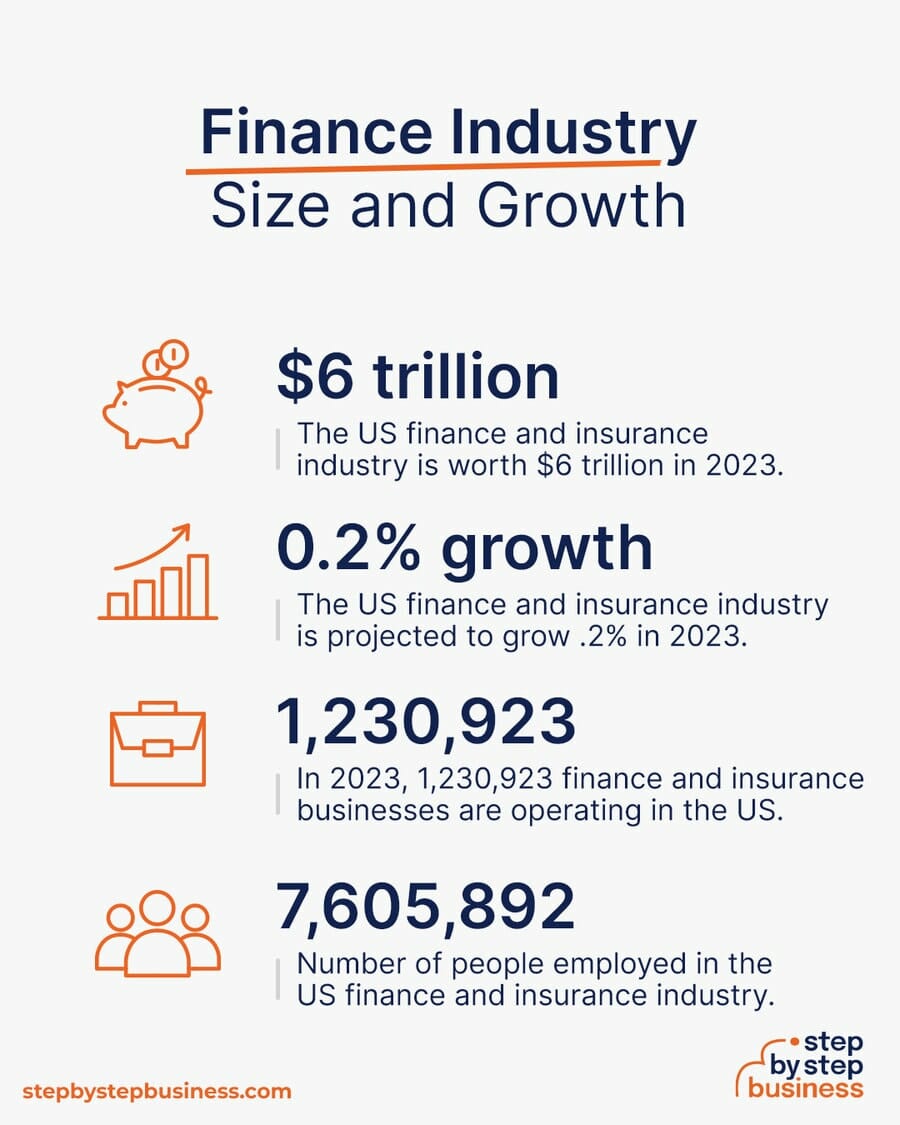
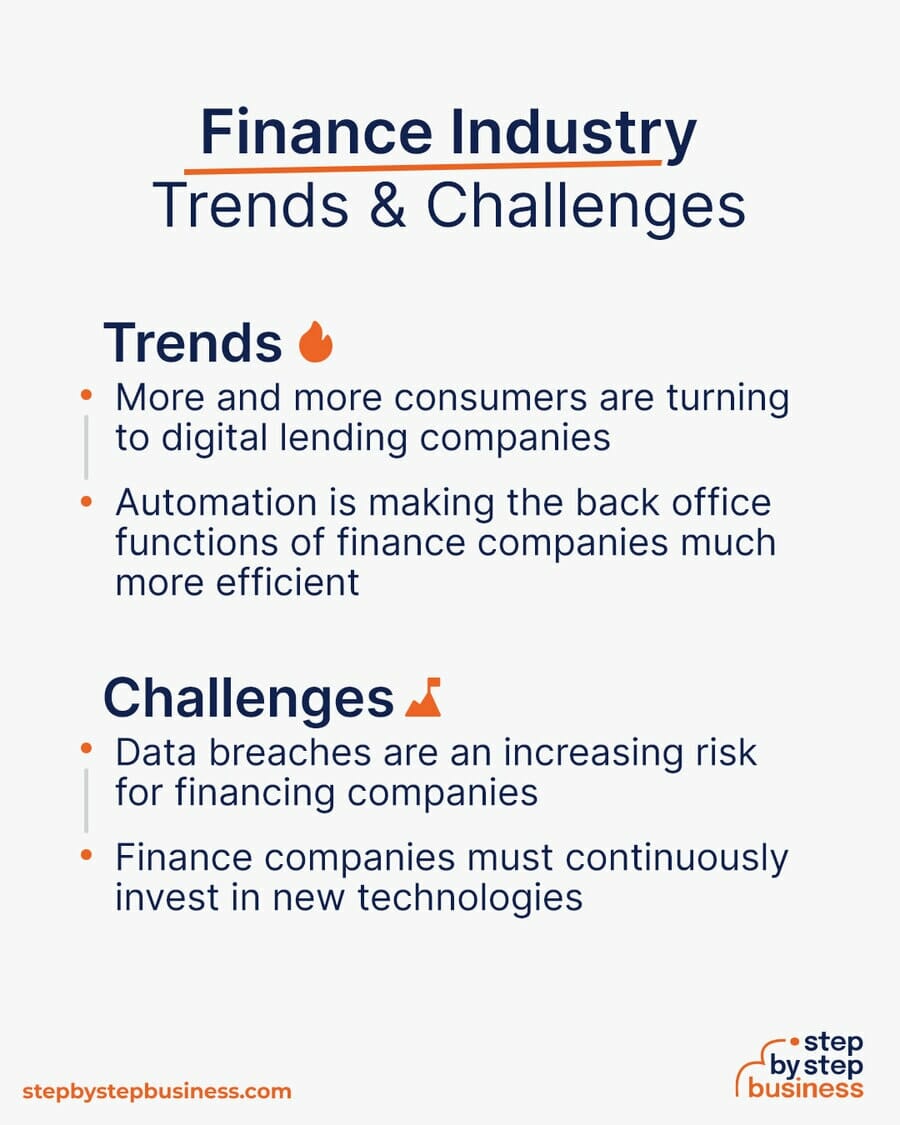
Trends
Challenges
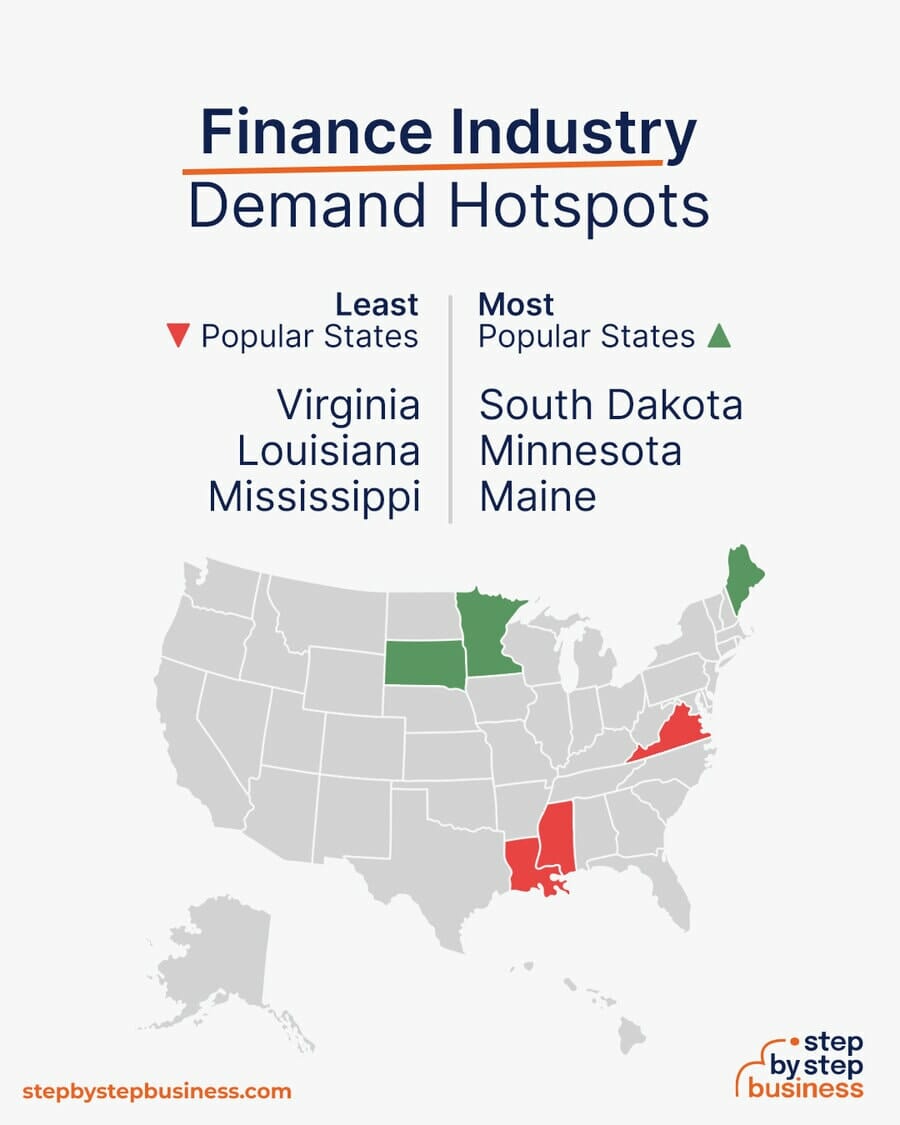
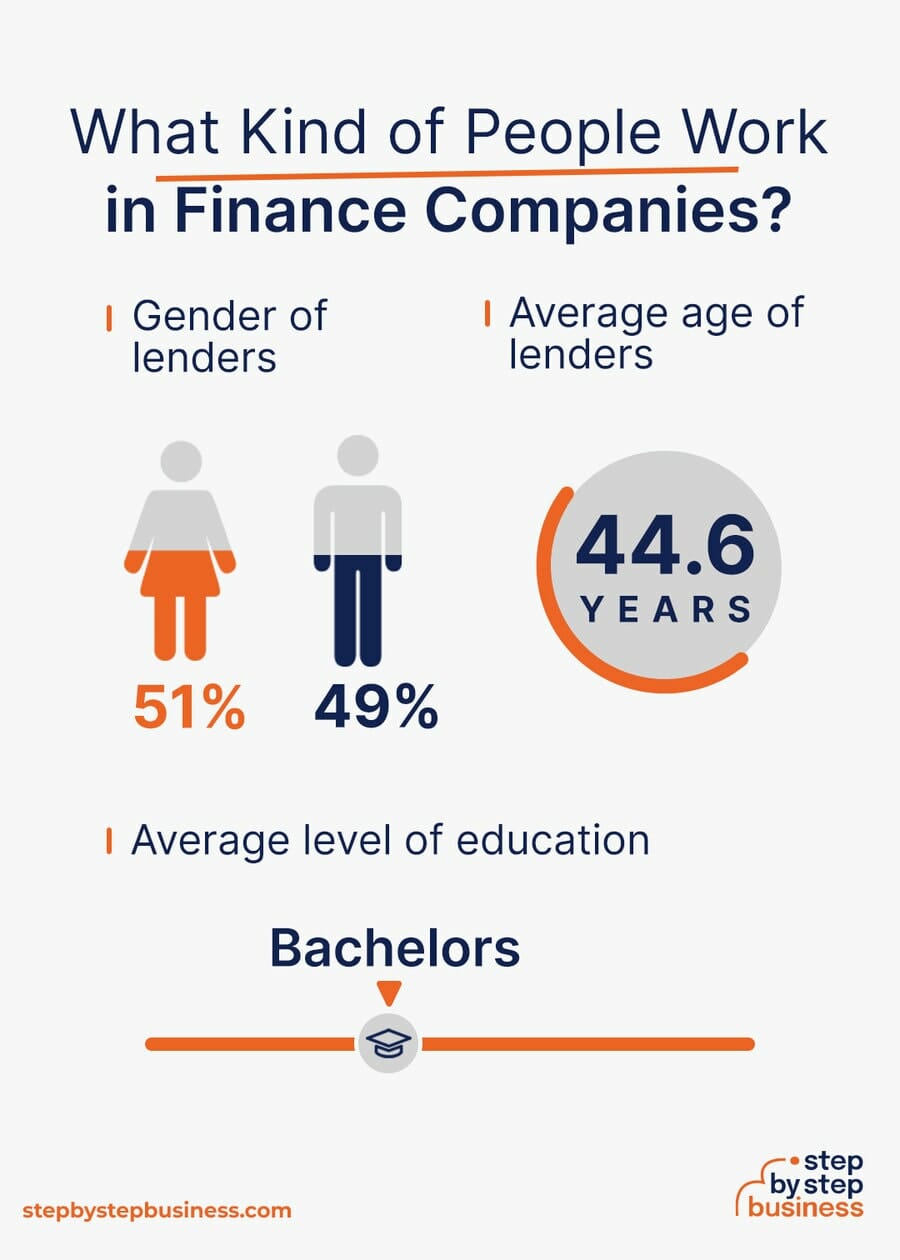
Startup costs for a finance company range from $40,000 to $70,000. Costs include licensing and insurance, office space rental and preparation, and capital reserves. Requirements for the bonding of finance companies and capital reserves vary by state.
You’ll need a handful of items to successfully launch your finance company business, including:
| Start-up Costs | Ballpark Range | Average |
|---|---|---|
| Setting up a business name and corporation | $100 - $500 | $300 |
| Business licenses and permits | $1,000 - $2,000 | $1,500 |
| Insurance | $2,500 - $5,000 | $3,750 |
| Website | $500 - $1,000 | $750 |
| Computer | $1,000 - $2,000 | $1,500 |
| Office space rental and furnishings | $4,000 - $6,000 | $5,000 |
| Business Software | $300 - $700 | $500 |
| Capital reserves | $30,000 - $50,000 | $40,000 |
| Sales and marketing budget | $500 - $1,000 | $750 |
| Total | $39,900 - $68,200 | $54,050 |
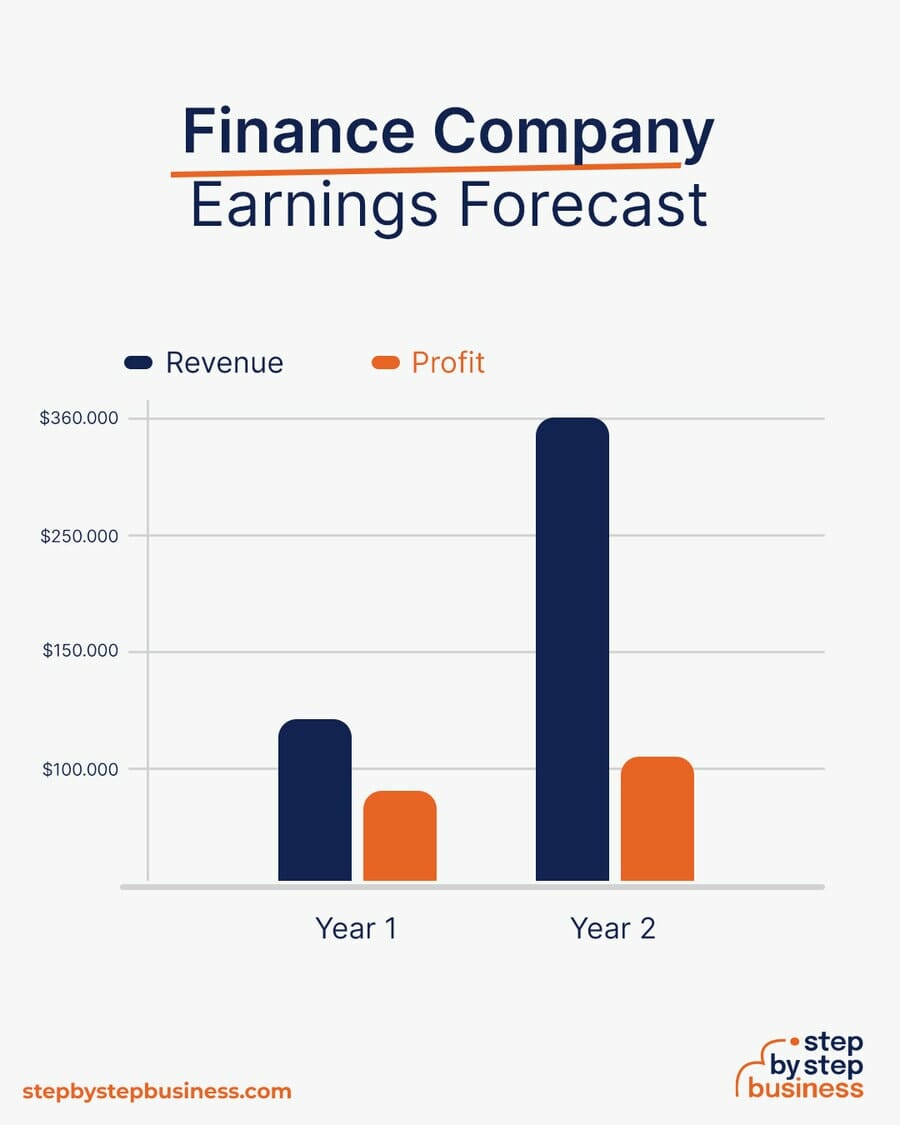
Generally, finance companies make money from an upfront fee based on the amount of the loan, usually 5%. The interest paid on the loan will be paid either to the partner lending institution or your investors, depending on your business model.
These calculations will assume that you’ll make an average loan amount of $20,000, but your loan amounts can vary based on the types of financing you offer. Your profit margin after overhead should be about 60%.
In your first year or two, you could make 10 loans per month, bringing in $120,000 in revenue. This would mean $72,000 in profit, assuming a 50% margin.
As you gain traction, you might make 30 loans a month. At this stage, you’d hire staff, reducing your margin to around 40%. With annual revenue of $360,000, you’d make a tidy profit of $108,000.
There are a few barriers to entry for a finance company. Your biggest challenges will be:
Now that you know what’s involved in starting a finance company, it’s a good idea to hone your concept in preparation to enter a competitive market.
Market research could give you the upper hand even if you’ve got the perfect product. Conducting robust market research is crucial, as it will help you better understand your customers, your competitors, and the broader business landscape.
Research finance companies in your area to examine their products and services, price points, and customer reviews.
This should identify areas where you can strengthen your business and gain a competitive edge to make better business decisions.
You’re looking for a market gap to fill. For instance, maybe the local market is missing an alternative lender that specializes in small business loans or start up loans.
You might consider targeting a niche, such as personal loans.
This could jumpstart your word-of-mouth marketing and attract clients right away.
Your products will be loans. Your best bet is to choose a niche such as small business loans.
Your fees should be based on market prices in your area, but also on your costs.
Once you know your costs, use this Step By Step profit margin calculator to determine your mark-up and final price points. Remember, the prices you use at launch should be subject to change if warranted by the market.
Your target market will depend on your niche. If you decide to specialize in small business loans, your customers will be business owners who you can find on LinkedIn or by calling on them directly.
You’ll need to rent out an office space. You can find commercial space to rent in your area on sites such as Craigslist, Crexi, and Instant Offices.
When choosing a commercial space, you may want to follow these rules of thumb:
Here are some ideas for brainstorming your business name:
Once you’ve got a list of potential names, visit the website of the US Patent and Trademark Office to make sure they are available for registration and check the availability of related domain names using our Domain Name Search tool below. Using “.com” or “.org” sharply increases credibility, so it’s best to focus on these.
Finally, make your choice among the names that pass this screening and go ahead and reserve your business name with your state, start the trademark registration process, and complete your domain registration and social media account creation.
Your business name is one of the key differentiators that sets your business apart. Once you pick a name, reserve it and start with the branding, it’s hard to switch to a new name. So be sure to carefully consider your choice before moving forward.
Here are the key components of a business plan:

If you’ve never created a business plan, it can be an intimidating task. You might consider hiring a business plan specialist to create a top-notch business plan for you.
Registering your business is an absolutely crucial step — it’s the prerequisite to paying taxes, raising capital, opening a bank account, and other guideposts on the road to getting a business up and running.
Plus, registration is exciting because it makes the entire process official. Once it’s complete, you’ll have your own business!
Your business location is important because it can affect taxes, legal requirements, and revenue. Most people will register their business in the state where they live, but if you are planning to expand, you might consider looking elsewhere, as some states could offer real advantages when it comes to finance companies.
If you’re willing to move, you could really maximize your business! Keep in mind, it’s relatively easy to transfer your business to another state.
Business entities come in several varieties, each with its pros and cons. The legal structure you choose for your finance company will shape your taxes, personal liability, and business registration requirements, so choose wisely.
Here are the main options:

We recommend that new business owners choose LLC as it offers liability protection and pass-through taxation while being simpler to form than a corporation. You can form an LLC in as little as five minutes using an online LLC formation service. They will check that your business name is available before filing, submit your articles of organization, and answer any questions you might have.
Choose Your State
The final step before you’re able to pay taxes is getting an Employer Identification Number, or EIN. You can file for your EIN online or by mail or fax: visit the IRS website to learn more. Keep in mind, if you’ve chosen to be a sole proprietorship, you can simply use your social security number as your EIN.
Once you have your EIN, you’ll need to choose your tax year. Financially speaking, your business will operate in a calendar year (January–December) or a fiscal year, a 12-month period that can start in any month. This will determine your tax cycle, while your business structure will determine which taxes you’ll pay.
The IRS website also offers a tax-payers checklist, and taxes can be filed online.
It is important to consult an accountant or other professional to help you with your taxes to ensure you are completing them correctly.
Securing financing is your next step and there are plenty of ways to raise capital:
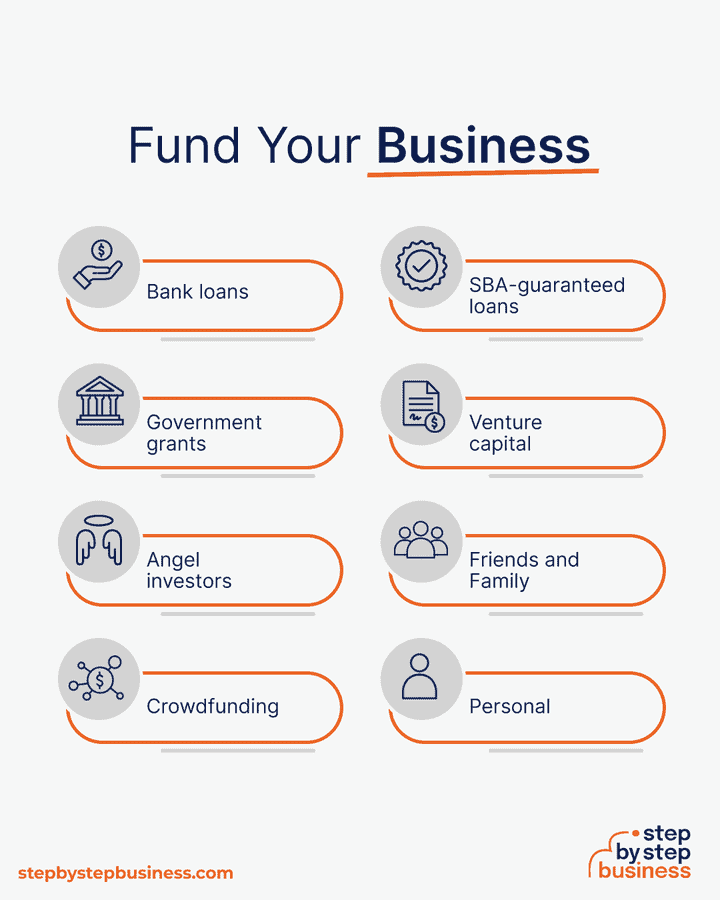
If you decide to partner with investors to fund your loans, you’ll need to find local venture capitalists to fund your business.
Starting a finance company business requires obtaining a number of licenses and permits from local, state, and federal governments.
Check with your state for finance company licensing requirements. You’ll also need to make sure that you follow all federal and state lending laws, including those of the Consumer Financial Protection Bureau.
Federal regulations, licenses, and permits associated with starting your business include doing business as (DBA), health licenses and permits from the Occupational Safety and Health Administration (OSHA), trademarks, copyrights, patents, and other intellectual properties, as well as industry-specific licenses and permits.
You may also need state-level and local county or city-based licenses and permits. The license requirements and how to obtain them vary, so check the websites of your state, city, and county governments or contact the appropriate person to learn more.
You could also check this SBA guide for your state’s requirements, but we recommend using MyCorporation’s Business License Compliance Package. They will research the exact forms you need for your business and state and provide them to ensure you’re fully compliant.
This is not a step to be taken lightly, as failing to comply with legal requirements can result in hefty penalties.
If you feel overwhelmed by this step or don’t know how to begin, it might be a good idea to hire a professional to help you check all the legal boxes.
Before you start making money, you’ll need a place to keep it, and that requires opening a bank account.
Keeping your business finances separate from your personal account makes it easy to file taxes and track your company’s income, so it’s worth doing even if you’re running your finance company business as a sole proprietorship. Opening a business bank account is quite simple, and similar to opening a personal one. Most major banks offer accounts tailored for businesses — just inquire at your preferred bank to learn about their rates and features.
Banks vary in terms of offerings, so it’s a good idea to examine your options and select the best plan for you. Once you choose your bank, bring in your EIN (or Social Security Number if you decide on a sole proprietorship), articles of incorporation, and other legal documents and open your new account.
Business insurance is an area that often gets overlooked, yet it can be vital to your success as an entrepreneur. Insurance protects you from unexpected events that can have a devastating impact on your business.
Here are some types of insurance to consider:

As opening day nears, prepare for launch by reviewing and improving some key elements of your business.
Being an entrepreneur often means wearing many hats, from marketing to sales to accounting, which can be overwhelming. Fortunately, many websites and digital tools are available to help simplify many business tasks.
You may want to use industry-specific software, such as Digifi, bakerhill, or Finastra, to manage your applications, deal flows, underwriting, and compliance.
Website development is crucial because your site is your online presence and needs to convince prospective clients of your expertise and professionalism. You can create your own website using services like WordPress, Wix, or Squarespace. This route is very affordable, but figuring out how to build a website can be time-consuming. If you lack tech-savvy, you can hire a web designer or developer to create a custom website for your business.
Your customers are unlikely to find your website, however, unless you follow Search Engine Optimization (SEO) practices. SEO will help your website appear closer to the top in relevant search results, a crucial element for increasing sales.
Make sure that you optimize calls to action on your website. Experiment with text, color, size, and position of calls to action such as “Apply Now”. This can sharply increase purchases.
Here are some powerful marketing strategies for your future business:

Unique selling propositions, or USPs, are the characteristics of a product or service that sets it apart from the competition. Customers today are inundated with buying options, so you’ll have a real advantage if they are able to quickly grasp how your finance company meets their needs or wishes. It’s wise to do all you can to ensure your USPs stand out on your website and in your marketing and promotional materials, stimulating buyer desire.
Global pizza chain Domino’s is renowned for its USP: “Hot pizza in 30 minutes or less, guaranteed.” Signature USPs for your finance company business could be:
You may not like to network or use personal connections for business gain. But your personal and professional networks likely offer considerable untapped business potential. Maybe that Facebook friend you met in college is now running a finance company business, or a LinkedIn contact of yours is connected to dozens of potential clients. Maybe your cousin or neighbor has been working in finance companies for years and can offer invaluable insight and industry connections.
The possibilities are endless, so it’s a good idea to review your personal and professional networks and reach out to those with possible links to or interest in finance companies. You’ll probably generate new customers or find companies with which you could establish a partnership.
If you’re starting out small from a home office, you may not need any employees. But as your business grows, you will likely need workers to fill various roles. Potential positions for a finance company business include:
At some point, you may need to hire all of these positions or simply a few, depending on the size and needs of your business. You might also hire multiple workers for a single role or a single worker for multiple roles, again depending on need.
Free-of-charge methods to recruit employees include posting ads on popular platforms such as LinkedIn, Facebook, or Jobs.com. You might also consider a premium recruitment option, such as advertising on Indeed, Glassdoor, or ZipRecruiter. Further, if you have the resources, you could consider hiring a recruitment agency to help you find talent.
Finance companies play a crucial role in any community, helping people to finance purchases or other expenses. By starting your own finance company, you’ll be providing value to your customers and making a healthy living. Eventually, you could hire a whole team to take your company to the next level.
Now that you understand the business, you’re ready to get your successful finance company off the ground!
Finance companies can be profitable, but it depends on factors such as the specific services offered, market conditions, competition, risk management practices, and the ability to attract and retain clients.
During a typical day at a finance company, activities may include client interactions, financial analysis and decision-making, loan origination or investment activities, risk management, administration and documentation, and business development and marketing efforts.
The growth potential of a finance company relies on factors such as market demand, competition, industry trends, innovation, and the ability to adapt to changing customer needs. Growth can be achieved through expanding services, entering new markets, attracting clients, or acquiring other firms.
Finance companies act as intermediaries, connecting borrowers and lenders, and offering access to capital, financial products, and specialized expertise to individuals, businesses, or other entities.

Published on April 1, 2023
Do you have a degree in finance or serious accounting skills? If so, now is a great time to start your own financial business and stop drivingsomebo ...
Read Now

Published on August 26, 2022
Everybody is looking for the next unicorn, the next brilliant billion-dollar business idea. One of the best places to look is in industry growth — ...
Read Now

Published on August 11, 2022
All entrepreneurs want their business to become a cash cow, but of course they cannot all get their wish. There are certain steps you can take,howev ...
Read Now
No thanks, I don't want to stay up to date on industry trends and news.
Comments